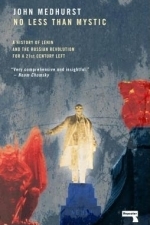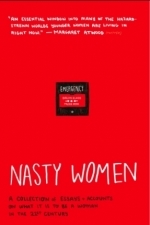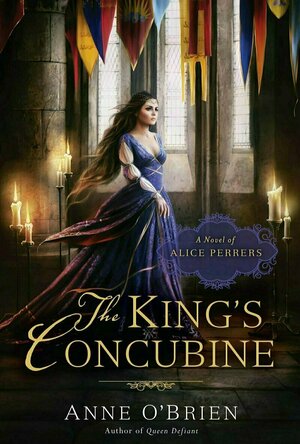
The King's Concubine
Book
A child born in the plague year of 1348, abandoned and raised within the oppressive walls of a...
Historical Fiction
Hazel (1853 KP) rated No More Than Mystic in Books
Sep 23, 2017
No Less Than Mystic: A Story of Lenin and the Russian Revolution for a 21st Century Left by John Medhurst is an in-depth historical and political insight to the truth about what really happened in Russia before, during and after the Bolshevik insurrection of October 1917. Beginning with the end of the Tsars rule and ending with Stalinism, Medhurst unearths the fact from the fiction, challenging the information the world has been led to believe.
As mentioned in Medhurst lengthy introduction, previous books on the subject are often biased and inaccurate. Swayed by political beliefs, authors and historians often pass judgement by using the information they have chosen to believe, dismissing anything that goes against their viewpoint. In this book, Medhurst filters through these false histories, preferring to cite from publications written at the time rather than those penned by people who did not witness the events between 1903 and 1921.
Medhurst’s narrative is more political than historical, often going off on tangents. In order to for the reader to obtain some sort of connection with the events described, the author contrasts them with more recent occurrences that readers may have observed or at least understand. These include the British miner’s strike, feminist movements, the Greek economy and a variety of other capitalist struggles.
The Russian revolution is a complex affair that cannot easily be condensed. As a result, No More Than Mystic exceeds 600 pages and covers every event, no matter how big or small, that contributed to the rise of USSR. Russia was a dangerous place to live during the 20th century, particularly when Leninism spiralled into Stalinism. However, Leninism was not all the history books make it out to be.
During GCSE History, one teacher led his class to believe that Lenin was good and Stalin was bad, however, the reality was much more complicated than that. Lenin was not the good guy that many painted him to be. Thousands died as a result of his policies from both execution and starvation. Yet, at the same time, Medhurst tries to point out the reasoning behind the ideas of the communist rulers, refusing to give a personal opinion without laying bare both sides of the argument.
Although this book is accurate and educational, it is not the easiest to sit down and read. Extensive chapters full of mind-numbing information detract from the comprehensive insightfulness of the content. Notwithstanding the fact that the inclusion of contrasting capitalist examples helps the reader to establish some form of familiar ground, the sudden changes in topic, location and time period are often confusing and hard to follow.
No Less Than Mystic is for the intellectual person with a great interest in 20th-century Russian history and communist affairs. Without any prior education on the topic, this book will not mean anything. It attempts to challenge the ingrained beliefs people have about what happened during the Bolshevik insurrection. Those who do not know anything will not benefit from the confronting enlightenment.
In all, No Less Than Mystic is a well-researched academic text that brings a fresh history of Lenin and the Russian Revolution. Those who want an unbiased truth need to read this book and be sceptical about any other on the topic. In order to form opinions, one must know the facts.
Hazel (1853 KP) rated No More Than Mystic in Books
Dec 7, 2018
No Less Than Mystic: A Story of Lenin and the Russian Revolution for a 21st Century Left</i> by John Medhurst is an in-depth historical and political insight to the truth about what really happened in Russia before, during and after the Bolshevik insurrection of October 1917. Beginning with the end of the Tsars rule and ending with Stalinism, Medhurst unearths the fact from the fiction, challenging the information the world has been led to believe.
As mentioned in Medhurst lengthy introduction, previous books on the subject are often biased and inaccurate. Swayed by political beliefs, authors and historians often pass judgement by using the information they have chosen to believe, dismissing anything that goes against their viewpoint. In this book, Medhurst filters through these false histories, preferring to cite from publications written at the time rather than those penned by people who did not witness the events between 1903 and 1921.
Medhurst’s narrative is more political than historical, often going off on tangents. In order to for the reader to obtain some sort of connection with the events described, the author contrasts them with more recent occurrences that readers may have observed or at least understand. These include the British miner’s strike, feminist movements, the Greek economy and a variety of other capitalist struggles.
The Russian revolution is a complex affair that cannot easily be condensed. As a result, <i>No More Than Mystic</i> exceeds 600 pages and covers every event, no matter how big or small, that contributed to the rise of USSR. Russia was a dangerous place to live during the 20th century, particularly when Leninism spiralled into Stalinism. However, Leninism was not all the history books make it out to be.
During GCSE History, one teacher led his class to believe that Lenin was good and Stalin was bad, however, the reality was much more complicated than that. Lenin was not the good guy that many painted him to be. Thousands died as a result of his policies from both execution and starvation. Yet, at the same time, Medhurst tries to point out the reasoning behind the ideas of the communist rulers, refusing to give a personal opinion without laying bare both sides of the argument.
Although this book is accurate and educational, it is not the easiest to sit down and read. Extensive chapters full of mind-numbing information detract from the comprehensive insightfulness of the content. Notwithstanding the fact that the inclusion of contrasting capitalist examples helps the reader to establish some form of familiar ground, the sudden changes in topic, location and time period are often confusing and hard to follow.
<i>No Less Than Mystic </i>is for the intellectual person with a great interest in 20th-century Russian history and communist affairs. Without any prior education on the topic, this book will not mean anything. It attempts to challenge the ingrained beliefs people have about what happened during the Bolshevik insurrection. Those who do not know anything will not benefit from the confronting enlightenment.
In all, <i>No Less Than Mystic</i> is a well-researched academic text that brings a fresh history of Lenin and the Russian Revolution. Those who want an unbiased truth need to read this book and be sceptical about any other on the topic. In order to form opinions, one must know the facts.
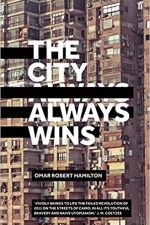
The City Always Wins
Book
'Omar Robert Hamilton brings vividly to life the failed revolution of 2011 on the streets of Cairo,...
Eilidh G Clark (177 KP) rated Nasty Women in Books
May 13, 2017
Becca Inglis
Nasty Women, published by 404 ink, is a collection of essays about what it is, and how it feels to be a woman in the 21st century. When I first picked up the book, I assumed, like I think most readers would, that it would be an easy book to just pick up and put down whenever I had a spare ten minutes. Wrong, I was sucked into this book right from the beginning, and read it all in a day. That doesn’t mean it was an easy read, or perhaps easy is the wrong word – it isn’t a comfortable read - and it isn’t meant to be. Nasty women is hard-hitting, eye-opening, and unashamedly honest.
The book opens with ‘Independence Day’ by Katie Muriel. A story of mixed race and identity in Trump’s America, Muriel discusses her experience of inter-family racism, heightened by political differences, ‘This is not the first, nor is it the last family divide Trump will leave in his wake, but I refuse to think of him as some deity who stands around shifting pieces on a board in his golden war room.’ The anger in this piece is clear, but it is the rationalism and clarity of the writer that speaks volumes. Race, racism and xenophobia, is a prominent feature in these stories. Claire L. Heuchan, for example, talks about ‘Othering’ a term that readers will see repeatedly in this book, ‘Scotland,’ she writes, ‘is a fairly isolating place to be a black woman.’
Survival is a key trope in Nasty Women. Mel Reeve, in ‘The Nastiness of Survival,’ talks about being a survivor of rape and emotional abuse, ‘I do not fit the ‘right’ definition of someone who has been raped.’ This statement alone is filled with irony.
I was particularly drawn to Laura Waddell’s essay, ‘Against Stereotypes: Working Class Girls and Working Class Art.’ Laura talks about the difficulty of both gender and class inequality, and, in particular, the lack of working class writers and working class fiction being published, ‘I have read a lot of fiction’ she says, ‘I have read almost none from housing estates such as the one I grew up on. These stories are missing, from shelves, and from the record.’ As a Scottish fiction writer from a working-class background myself, these words resonate deeply.
Alice Tarbuck’s ‘Foraging and Feminism: Hedge-Witchcraft in the 21st Century’, is almost fun to read in a deeply devastating way. There is a desperate tone in this piece, and a desperate need to escape society. ‘There is beauty and bounty around us if we look for it, and perhaps that is all the magic we need. Or perhaps, what we need is real magic, whether that comes in the form of resistance and community or the form of blackthorn charms and skullcap tinctures, and howling to the moon.
I loved this book. This book gives women a voice. And it is loud! Well done 404 Ink, and all the contributors, for bravely breaking the silence.
Phil Leader (619 KP) rated 2084 in Books
Nov 8, 2019
Following his selection for work in one of the Ministries David very soon finds out the truth. The wider populace are controlled by fear, propaganda and lies. The workers in the Ministry are controlled by greed, power and lust. He soon learns that the whole system is corrupt, rotten to the core, despite the all-powerful and dispassionate AIs that are supposed to only benefit mankind. But as one man there is little he can do, and certainly nobody he can trust. But there are plenty who want to use him as a weapon is their political infighting and power battles.
Clearly a more technological update on 1984, Hogan tackles this grim subject matter from the human perspectives of David and his childhood friend Juli, who is also pulled into the dark world of the power and corruption. Like peeling a rotten onion, layer after layer is removed, finally revealing the rotten heart. Along the way there are some huge plot twists, shocking events and reveals that completely change how the reader understands this future vision. The ending, which it comes, is certainly cataclysmic.
As with the best science fiction, this casts a light on the world we live in with certain current events clearly used as a basis for how Hogan constructed his dystopia. Sometimes the subtext isn't as subtle as it could be, but there is no denying the chilling warning it delivers.
Note: This book contains multiple scenes and themes of a sexual nature

The Porcelain Thief
Book
In 1938, with the Japanese army approaching from Nanking, Huan Hsu's great-great grandfather, Liu,...
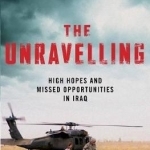
The Unravelling: High Hopes and Missed Opportunities in Iraq
Book
"As a Brit, a woman and a liberal, Emma Sky's presence and position in Iraq following the invasion...
Poetic & Real Worlds of Cesar Vallejo (18921938): A Struggle Between Art & Politics
Book
The world-renowned Peruvian poet Cesar Vallejo (18921938) was also a journalist, essayist, novelist...
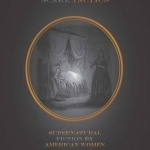
Scare Tactics: Supernatural Fiction by American Women, with a New Preface
Book
Scare Tactics identifies an important but overlooked tradition of supernatural writing by American...
